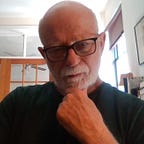Calling 9/11
For What it Was and Is
Out for a late-night walk this week, I saw what’s become a familiar sight in September — a beacon shining up from the former site of the World Trade Center. This lonely blue beam seemed a symbol of the narrow view Americans have taken on the events of twenty years ago.
I knew people who were killed in the World Trade Center that day, and others who barely escaped. The thousands of civilians who died were victims of an atrocious war crime. Even so, I agree with those who say it’s time to re-examine what happened and why.
The 9/11 assault on America was not an isolated act of “terrorism.” It was a shot heard round the world, as momentous as Lexington and Concord — -the opening battle in a clash of civilizations. It’s a war that was long in coming, still going on, and which we are inexorably losing.
The George W. Bush administration was warned of the 9/11 attacks by US intelligence which it chose to ignore. But the public had been warned much earlier— in a 1993 essay by a crusty Harvard historian. In the journal Foreign Affairs, Samuel Huntington wrote that the next world war would be a “clash of civilizations” — a counter-raid by conservative Muslim and Confucian societies against America’s world empire.
Huntington’s essay was hastily dismissed by other historians. In a follow-up issue of Foreign Affairs, middle-east maven Fouad Ajami insisted that world wars could only be fought by state powers. Ajami later became a supporter of the US invasion o f Iraq, which was in line with his theory but detached from reality. The reality is that the United States is the leader not of a free world, but a failed world, and its enemies are those who don’t want to live in it.
Our nation was founded on a unique phrase — the “pursuit of happiness.” Thomas Jefferson’s declaration was based on English philosopher John Locke, who argued for the rights of “life, liberty and property.” Jefferson preferred a final phrase so vague that it could inspire both a runaway slave and the bounty-hunter chasing him through the woods.
Thus we have pursued happiness for nearly 250 years, and wound up more miserable than we began. As F. Scott Fitzgerald described it in The Great Gatsby — “There are only the pursued, the pursuing, the busy and the tired.”
Happiness has taken the form of outsize property holdings, low taxes, racial privilege, gouging the environment, exploitation of labor, disregard for the poor, and a glut of consumer products, from salty snacks to SUVs, designed to addict their users — -all wrapped in an avalanche of plastic waste. We’ve had our ups and downs, but starting on 9/11, the world delivered its verdict on the American empire.
Thumbs down.
